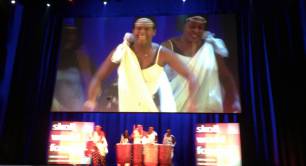Getting up close and proximate with President Carter
When a 93-year-old warns that we are in a moment in history when we are facing the possibility of the end of all human beings, one might be inclined to take such remarks with a pinch of salt.
When that 93-year-old also happens to be perfectly sound of mind, a former president of the world’s most powerful nation and a Nobel Peace Prize winner, the world ignores him at its peril.
President Jimmy Carter was addressing a gathering of 1,500 social entrepreneurs from across the globe at the opening session of the Skoll World Forum on Social Entrepreneurship, taking place this week in Oxford, UK.
He also revealed his belief that the “greatest disparity” confronting society was no longer disparity of income – despite the fact that this had grown – but “discrimination against women and girls”.
Carter claimed that 160 million women were “no longer living on earth” because of issues such as gender prejudice. For every 100 women in China there were 118 men. In India there were 112, he said. “So something happened to the other 12 girls.”
It seems that the waves generated by movements such as #MeToo are gaining energy not only from millennials but also from presidential nonagenarians.
Yet, outside the US, millennials might not even be aware of the man who in 2012 became the longest-retired president in US history. There have, after all, been six new US presidents since Carter served from 1977 to 1981 (Ronald Reagan, George HW Bush, Bill Clinton, George W Bush, Barack Obama, Donald Trump).
Getting along with each other and treating each other as equals is one of the hardest things on earth
As one might expect from a person of his seniority, standing and life experience, Carter is both a gentle and powerful presence on stage.
Taking the World Forum’s theme of “proximity” as his lodestar, Carter observed that “in modern day society we are all proximate”. Yet huge threats to human existence such as global warming and tensions between superpowers showed that we needed to “take advantage of our proximity to see if we can live in peace on earth” alongside people with whom we disagree.
“It’s a question I faced,” he said. “It’s a question President Trump faces now.”
We were all inclined as humans to “feel superior to somebody”, Carter said. “Getting along with each other and treating each other as equals is one of the hardest things on earth.” He said he had pledged to look at people who were different from him with the same “respect and love that I look at my wife”.
In a warm and broad-ranging interview conducted by Sally Osberg, President and CEO of the Skoll Foundation, Osberg drew insight from Carter on subjects as varied as the eradication of the guinea worm disease (led by the Carter Center), and the positive activism of the Parkland shooting students, to his love of fly-fishing, furniture making, bird-watching and painting (he’s currently working on a painting of Cardinal birds with snowfall for the Carter Center Christmas card).
On Parkland, he spoke of the “deleterious influence” of the National Rifle Association and being “plagued by excessive firearms”.
I’m a better fisherman than she is, but she is luckier than I am
Perhaps most personal among his answers, and a clue to his new focus on women and girls, was his searing respect and love for the strong women in his own life – including his wife of 72 years, Rosalynn (“I’m a better fisherman than she is, but she is luckier than I am.”) and his inspirational late mother, Miss Lillian, a former nurse who at age 68 became a peace corps volunteer aiding patients in India afflicted by leprosy.
Asked by Osberg for some concluding observations about the rise of nationalism and populist movements, Carter acknowledged that democracy, freedom and truth had been "shaken". But he countered: "I still have faith... I think we will prevail."
Before leaving to catch forum founder Jeff Skoll’s plane back to the US, Carter became the seventh person – and only the first American – to receive a Skoll Global Treasure Award, following in the footsteps of Bono, the Dalia Lama, Graça Machel, Malala Yousafsai, Muhammad Yunus and Archbishop Desmond Tutu.
Watch this space for more stories from the Skoll World Forum and fringe conference Marmalade



